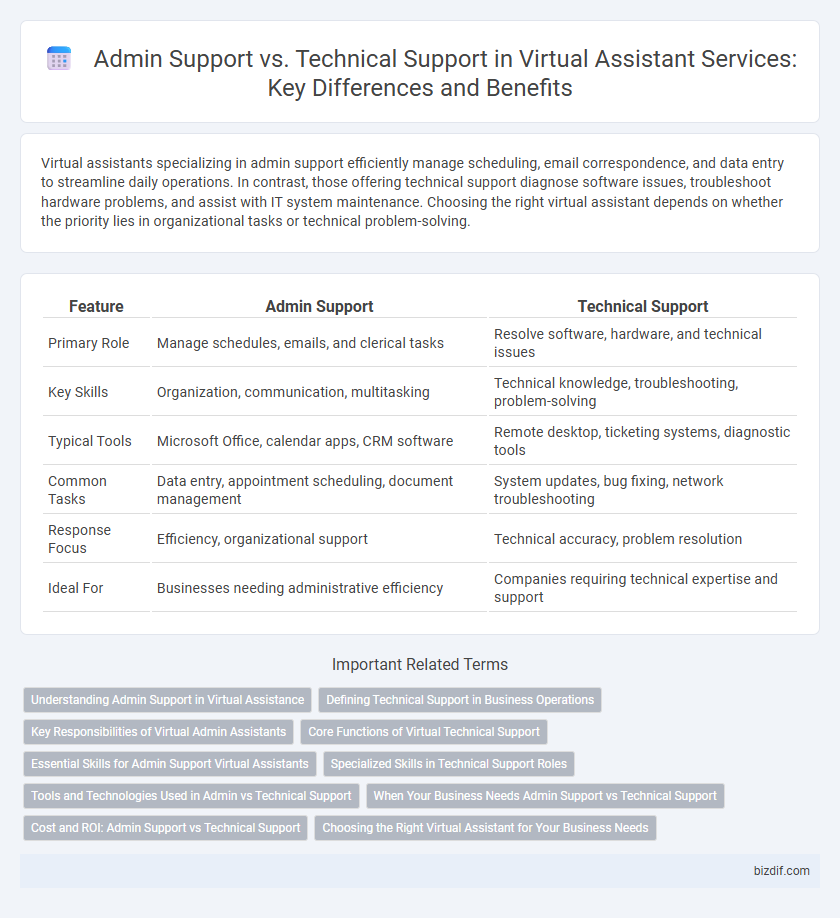Virtual assistants specializing in admin support efficiently manage scheduling, email correspondence, and data entry to streamline daily operations. In contrast, those offering technical support diagnose software issues, troubleshoot hardware problems, and assist with IT system maintenance. Choosing the right virtual assistant depends on whether the priority lies in organizational tasks or technical problem-solving.
Table of Comparison
| Feature | Admin Support | Technical Support |
|---|---|---|
| Primary Role | Manage schedules, emails, and clerical tasks | Resolve software, hardware, and technical issues |
| Key Skills | Organization, communication, multitasking | Technical knowledge, troubleshooting, problem-solving |
| Typical Tools | Microsoft Office, calendar apps, CRM software | Remote desktop, ticketing systems, diagnostic tools |
| Common Tasks | Data entry, appointment scheduling, document management | System updates, bug fixing, network troubleshooting |
| Response Focus | Efficiency, organizational support | Technical accuracy, problem resolution |
| Ideal For | Businesses needing administrative efficiency | Companies requiring technical expertise and support |
Understanding Admin Support in Virtual Assistance
Admin support in virtual assistance involves managing schedules, handling correspondence, and organizing data to ensure smooth business operations. Virtual assistants provide tasks like calendar management, email filtering, and document preparation, boosting productivity without the need for on-site staff. This support streamlines routine administrative workflows, allowing businesses to focus on core activities while reducing overhead costs.
Defining Technical Support in Business Operations
Technical support in business operations involves troubleshooting and resolving IT-related issues, including software, hardware, and network problems, ensuring minimal downtime and operational efficiency. This support is critical for maintaining business continuity and enhancing productivity by enabling employees to focus on core tasks without technical disruptions. Technical support teams often provide installation, configuration, and system maintenance services tailored to an organization's specific technology infrastructure.
Key Responsibilities of Virtual Admin Assistants
Virtual admin assistants are responsible for managing schedules, handling correspondence, organizing files, and coordinating meetings to ensure smooth office operations. They maintain accurate records, manage email inboxes, and perform data entry tasks that support administrative efficiency. Unlike technical support, their key focus is on clerical tasks rather than troubleshooting hardware or software issues.
Core Functions of Virtual Technical Support
Virtual technical support primarily focuses on troubleshooting software issues, managing network configurations, and resolving hardware problems to ensure seamless operation of digital systems. It involves monitoring system performance, updating software, and providing solutions to technical queries, which distinguishes it from general administrative support tasks like scheduling and data management. Technical support specialists employ diagnostic tools and remote access technologies to quickly identify and fix technical problems, ensuring minimal downtime for clients.
Essential Skills for Admin Support Virtual Assistants
Admin support virtual assistants excel in organizational skills, effective communication, and calendar management, ensuring smooth office operations and task prioritization. Proficiency in Microsoft Office, email handling, and data entry are critical technical skills that enhance productivity and accuracy. These assistants also demonstrate strong problem-solving abilities and attention to detail, which are essential for managing client schedules and correspondence efficiently.
Specialized Skills in Technical Support Roles
Technical support roles demand specialized skills such as network troubleshooting, software debugging, and hardware diagnostics that are beyond the scope of general administrative support. Admin support typically handles scheduling, correspondence, and data management, whereas technical support requires expertise in specific technologies and problem-solving methodologies. Mastery of tools like ticketing systems, remote desktop applications, and coding knowledge often distinguishes technical support professionals from their administrative counterparts.
Tools and Technologies Used in Admin vs Technical Support
Admin support typically utilizes productivity tools such as Microsoft Office Suite, Google Workspace, scheduling software like Calendly, and communication platforms including Slack or Zoom. Technical support relies heavily on diagnostic tools, ticketing systems like Zendesk or Jira, remote desktop applications, and network monitoring software to troubleshoot and resolve issues. Both roles benefit from knowledge management systems, but technical support demands deeper expertise in software debugging and system analysis platforms.
When Your Business Needs Admin Support vs Technical Support
Admin support is essential when your business requires efficient management of scheduling, correspondence, data entry, and customer service tasks to maintain smooth daily operations. Technical support becomes necessary when your business faces software issues, hardware malfunctions, network problems, or requires IT troubleshooting and system maintenance. Choosing the right virtual assistant depends on whether your priority is operational administration or resolving technology-related challenges.
Cost and ROI: Admin Support vs Technical Support
Admin support virtual assistants typically offer lower hourly rates compared to technical support, making them cost-effective for routine tasks like scheduling and email management. Technical support virtual assistants, although more expensive, deliver higher ROI by resolving complex IT issues and maintaining systems that prevent costly downtime. Investing in technical support yields long-term savings through enhanced system reliability, while admin support boosts operational efficiency with minimal expense.
Choosing the Right Virtual Assistant for Your Business Needs
Admin support virtual assistants handle scheduling, email management, and data entry, streamlining daily operations for efficiency and organization. Technical support virtual assistants specialize in troubleshooting software issues, managing IT queries, and maintaining system updates to ensure seamless technology use. Selecting the right virtual assistant depends on your business priorities--opt for admin support to enhance operational tasks or technical support to resolve complex technical challenges quickly.
Admin support vs Technical support Infographic

 bizdif.com
bizdif.com